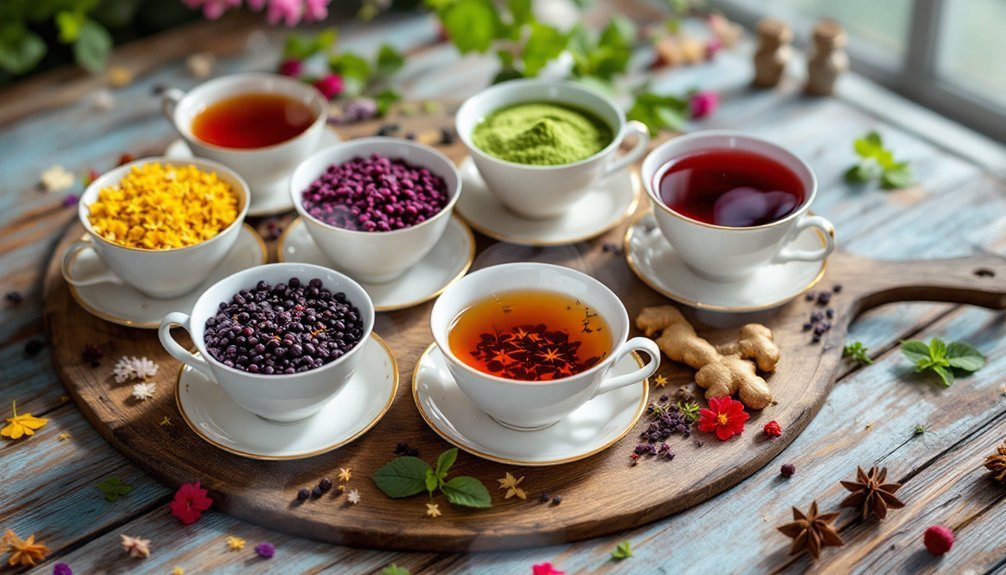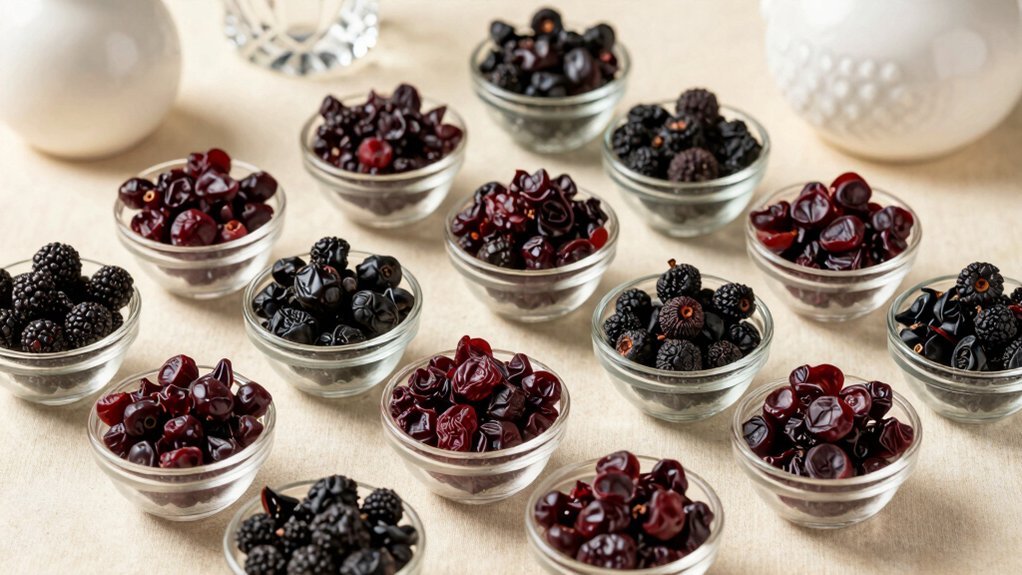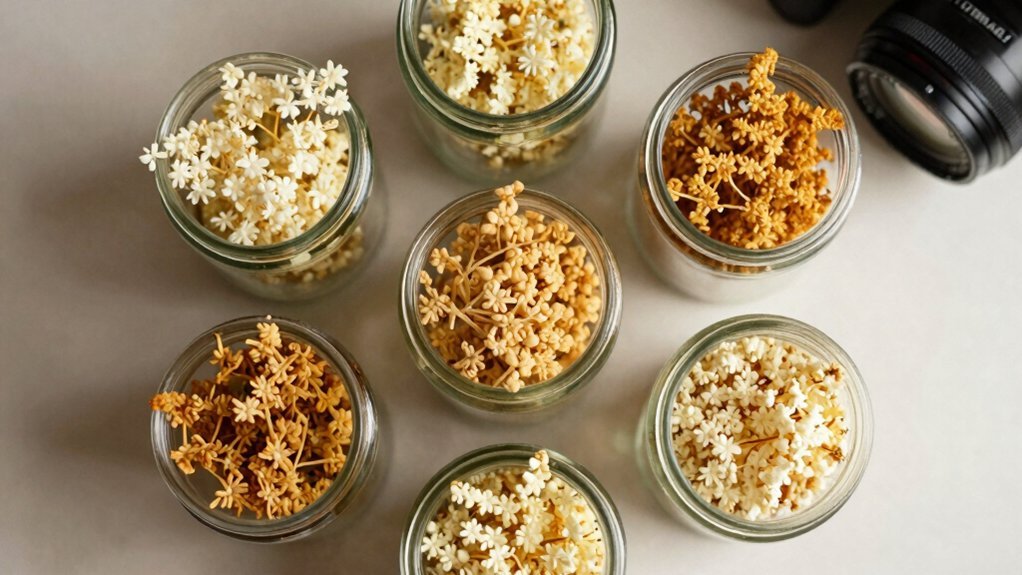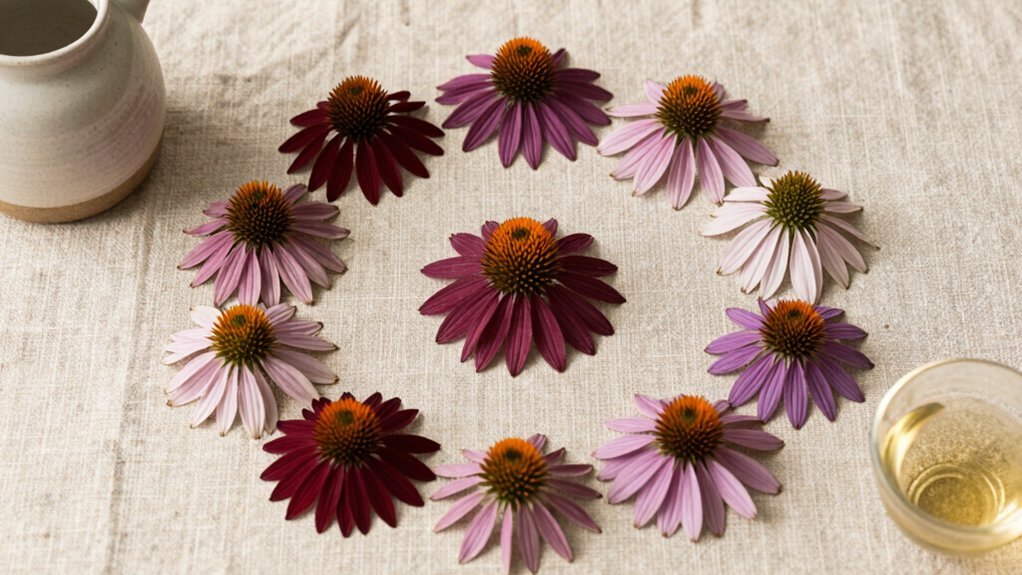If you're seeking natural remedies for common ailments, you'll find that medicinal teas offer a gentle yet effective path to wellness. From ancient healing traditions to modern herbalist recommendations, these powerful plant-based beverages can help address everything from sleepless nights to digestive troubles. While countless herbal options exist, five specific teas have earned their reputation as nature's most reliable healers. Let's explore what makes these particular brews so special.
The Good Living Guide to Medicinal Tea
Whether you're new to herbal remedies or seeking a practical guide for natural healing, The Good Living Guide to Medicinal Tea stands out as a beautifully crafted hardbound reference. You'll find easy-to-follow recipes for common ailments like colds, allergies, and stomach aches, along with solutions for chronic conditions.
The book's well-organized index helps you quickly locate specific recipes, while clear brewing instructions guarantee you'll get the most from your herbs. Users report significant health improvements, particularly with conditions like asthma. While it won't cover every herb variety, you'll appreciate the thorough information on tea types, their benefits, and proper brewing techniques.
Best For: Beginners and casual herbal tea enthusiasts seeking a practical, well-organized guide to brewing medicinal teas for common health concerns.
Pros:
- Beautiful hardbound presentation with excellent layout and easy-to-navigate index
- Simple, accessible recipes with clear brewing instructions for common ailments
- Comprehensive information on tea types and their health benefits backed by user testimonials
Cons:
- Limited variety of herbs covered compared to more extensive herbal guides
- May be too basic for advanced herbalists or those seeking in-depth medicinal information
- Focuses primarily on common ailments rather than covering a broader range of health conditions
Natural Herbal Remedies: Herbal Medicine for Everyday Ailments
For those seeking an extensive guide to herbal healing, "Natural Herbal Remedies" offers both beginners and experienced herbalists a valuable resource for understanding medicinal teas.
You'll find detailed instructions on creating healing teas, with emphasis on proper steeping times of 15-20 minutes to maximize therapeutic benefits. Richard Bray's thorough guide teaches you how to make infusions, decoctions, tinctures, and syrups, including elderberry recipes.
The book covers herbs like garlic, honeysuckle, and licorice, explaining their uses for various ailments from colds to Alzheimer's. While incorporating scientific backing, it includes helpful illustrations and photographs to identify plants, though some British terms might need clarification for American readers.
Best For: Individuals interested in natural healing methods who want a comprehensive guide to herbal remedies, from beginners seeking basic knowledge to experienced herbalists looking to expand their expertise.
Pros:
- Provides detailed, easy-to-follow instructions for creating various herbal preparations (teas, tinctures, syrups)
- Includes scientific explanations and comprehensive coverage of herbs for multiple ailments
- Features helpful visual aids including illustrations and photographs for plant identification
Cons:
- British terminology may be confusing for American readers
- Reference system could be better organized and more clearly connected to the text
- Contains potentially questionable content (chart dated 2055) that raises accuracy concerns
Rosemary Gladstar's Medicinal Herbs: A Beginner's Guide
Novice herbalists seeking a trustworthy guide to natural healing will find an invaluable companion in "Rosemary Gladstar's Medicinal Herbs: A Beginner's Guide." This approachable book demystifies herbal medicine by breaking down complex concepts into practical, easy-to-follow instructions for creating teas, tinctures, and salves.
You'll discover 33 common herbs and their medicinal uses, with clear guidance on growing conditions and simple recipes. With just basic kitchen equipment, you can start making remedies like Rosemary-Lemon Thyme tea and Plantain salve. Gladstar's engaging writing style makes you feel like you're learning from a knowledgeable friend, while the book's beautiful photos and thoughtful organization help you navigate your journey into holistic healing.
Best For: Beginners interested in learning about herbal medicine who want a practical, accessible guide to making their own natural remedies at home.
Pros:
- Clear, step-by-step instructions for creating herbal remedies using common kitchen equipment
- Comprehensive coverage of 33 common herbs with practical recipes and growing information
- Beautiful photography and well-organized format makes the content easy to navigate and understand
Cons:
- Limited to only 33 herbs, which may leave out some interesting or useful medicinal plants
- Focuses primarily on basic applications, may not satisfy those seeking advanced herbal knowledge
- Some recipes require multiple ingredients or tools that might need to be purchased separately
Herbal Medicine Chart – 140 Herbs Reference Guide
Enthusiasts seeking extensive herbal knowledge will find the Herbal Medicine Chart invaluable as a quick-reference guide to 140 common healing herbs. This durable, waterproof chart packs essential information about medicinal properties, safety guidelines, and practical applications into a compact 12×9-inch format.
You'll discover detailed insights into each herb's healing potential, from digestive support to stress relief. While the chart serves as an excellent foundation for understanding herbal medicine, it emphasizes consulting healthcare professionals before starting any herbal regimen. Whether you're a beginner or experienced herbalist, you'll appreciate its tear-free plastic construction and thorough overview of natural wellness solutions.
Best For: Herbalism students, natural health enthusiasts, and wellness practitioners seeking a comprehensive quick-reference guide to common medicinal herbs.
Pros:
- Durable waterproof construction ensures longevity and practical daily use
- Comprehensive overview of 140 herbs with detailed medicinal properties and applications
- Clear safety guidelines and contraindications for informed herbal use
Cons:
- Small 12×9-inch size may make text dense and potentially difficult to read
- Requires additional research for deeper understanding of specific herbs
- Limited space means some herb descriptions may lack detailed dosage information
35 Medicinal & Tea Herb Seeds Variety Pack for Garden Planting
Growing your own medicinal and tea herbs becomes effortless with this extensive 35-variety seed pack, which offers over 16,335 non-GMO heirloom seeds for both indoor and outdoor cultivation. You'll find everything from Anise to Thai Basil, complete with resealable bags and QR codes for growing instructions.
Whether you're using hydroponics indoors or planting in your garden, these USA-made seeds boast high germination rates and can last up to three years when stored properly. You'll appreciate the value of this gift-worthy collection, perfect for housewarming presents or special occasions. While some customers noted minor packaging issues, the 4.4-star rating reflects the overall quality and variety of this family-owned company's product.
Best For: Home gardeners, tea enthusiasts, and health-conscious individuals looking to grow their own organic medicinal herbs and teas with a diverse variety of non-GMO seeds.
Pros:
- Extensive variety with 35 different herb types and over 16,000 seeds providing excellent value
- High-quality, USA-made seeds with good germination rates and up to 3-year shelf life
- Includes QR codes for easy access to growing instructions and educational resources
Cons:
- Some customers reported issues with packaging design and seed containment
- Requires regular maintenance and proper growing conditions for optimal results
- May be overwhelming for complete beginners due to the large variety of herbs
Factors to Consider When Choosing a Medicinal Tea Guide
When selecting a medicinal tea guide, you'll want to make certain it provides thorough details about each herb's properties while featuring clear, step-by-step brewing instructions backed by scientific research. Look for guides that include helpful visual elements like plant identification photos, brewing charts, and dosage tables to enhance your learning experience. The guide should also prioritize safety by outlining potential herb interactions, contraindications, and appropriate usage guidelines for different health conditions.
Content Depth and Detail
Selecting a thorough medicinal tea guide requires careful attention to content depth and detail. You'll want to look for guides that provide extensive recipes with precise brewing instructions and extraction methods for various health conditions. The best resources include detailed information about each herb's medicinal properties, potential side effects, and safety considerations.
When evaluating content quality, prioritize guides that back their claims with scientific research, helping you understand how specific herbs interact with your body. You'll also benefit from guides featuring clear visual aids, making herb identification straightforward and practical. A well-organized index or table of contents is essential, allowing you to quickly locate specific remedies for your needs. These elements guarantee you'll have reliable, actionable information at your fingertips.
Recipe Clarity and Instructions
Clear recipe instructions serve as the backbone of any reliable medicinal tea guide. When selecting your guide, you'll want to look for one that breaks down each recipe into manageable, step-by-step instructions that eliminate guesswork. Pay attention to whether the guide specifies precise steeping times, typically 15-20 minutes, to guarantee you're extracting the maximum healing benefits from your herbs.
The best guides feature straightforward ingredient lists that don't overwhelm you with complex combinations, making them perfect for beginners. They'll also provide multiple recipe variations for each herb, allowing you to address different health concerns with the same ingredients. Don't forget to check the guide's organization – a well-structured index will help you quickly locate specific recipes when you need them most.
Scientific Research Backing
A reliable medicinal tea guide should feature scientifically-validated research that supports its herbal recommendations. You'll want to look for guides that cite clinical trials and peer-reviewed studies demonstrating the effectiveness of specific herbs. Pay attention to guides that explain the bioactive compounds, like flavonoids and phenolic acids, and their proven health benefits.
The best guides will include detailed preparation instructions based on scientific evidence, as steeping time and temperature directly affect the extraction of beneficial compounds. They should also highlight safety considerations, including potential drug interactions and contraindications. When evaluating research claims, prioritize guides that reference studies showing measurable outcomes, such as improved cardiovascular health, reduced anxiety levels, or enhanced immune function. Look for specific data rather than vague wellness claims.
Visual Learning Elements
Effective medicinal tea guides should feature extensive visual elements that enhance your learning experience. Look for guides that include detailed illustrations and photographs of herbs to help you identify plants accurately and understand their characteristics. You'll want clear, step-by-step visual instructions that demonstrate proper brewing methods, ensuring you'll get the most benefit from your medicinal teas.
Pay attention to guides that incorporate helpful charts and infographics summarizing herb benefits and properties. Color-coded sections make it easier to navigate between different herb types and quickly locate safety information. Additionally, guides that show herbs in their natural habitats through high-quality visuals will give you valuable insights into growing conditions, helping you source or cultivate your own medicinal plants effectively.
Herb Safety Information
Safety considerations should be paramount when selecting a medicinal tea guide, as herbal remedies can pose risks if not used properly. Before you start any herbal tea regimen, you'll need to consult your healthcare provider, especially if you're taking medications or have existing health conditions.
When choosing your tea guide, look for resources that clearly outline contraindications and potential side effects. For instance, if you have high blood pressure, you'll want to avoid teas containing licorice. If you're pregnant or nursing, you'll need extra caution, as certain herbs aren't safe during these periods. Additionally, make sure your guide includes detailed plant identification information to prevent confusion with toxic lookalikes. A reliable guide should emphasize the importance of proper dosage and preparation methods for each herb.
Author's Expertise Level
When selecting a medicinal tea guide, evaluating the author's expertise level should be your top priority. You'll want to look for writers who've completed formal education in herbal medicine or health sciences, as they're more likely to provide accurate, science-based information about herbs and their effects.
Check if the author is a recognized practitioner or educator in the herbal community. Their reputation and standing among peers can tell you a lot about their knowledge and commitment to safe practices. While personal experiences can make the content more relatable, they shouldn't be the only basis for recommendations. The best guides often come from authors who combine academic knowledge with practical experience, offering you both scientifically-backed information and real-world applications for using medicinal teas effectively.
Reference Tool Functionality
Beyond the author's credentials, the functionality of your medicinal tea guide will shape your daily experience with herbal remedies. When choosing a guide, you'll want to verify it offers clear, step-by-step recipes that are easy to follow, whether you're a novice or seasoned herbalist.
Look for an extensive index that lets you quickly find specific herbs and their healing properties. The best guides include detailed descriptions of each herb's medicinal benefits and applications, along with high-quality photos or illustrations to help you identify plants correctly. Most importantly, don't overlook the safety information – your guide should prominently display warnings about potential side effects and contraindications. These essential features will help you confidently prepare and use herbal remedies while safeguarding your safety and ideal results.
Frequently Asked Questions
Can I Drink Medicinal Teas While Taking Prescription Medications?
You'll need to consult your doctor before drinking medicinal teas with prescription medications, as some herbs can interact with drugs. It's crucial to get professional medical advice for your specific situation.
How Long Can Brewed Medicinal Tea Be Stored Before Going Bad?
You'll want to drink your brewed medicinal tea within 24-48 hours if refrigerated. It's best to consume it fresh, but if you store it in an airtight container, it'll stay safe for about two days.
Are Medicinal Teas Safe During Pregnancy and Breastfeeding?
You shouldn't drink medicinal teas during pregnancy or breastfeeding without consulting your healthcare provider first. Many herbs can affect your baby, so it's best to get professional guidance before consuming them.
What Time of Day Is Best for Drinking Specific Medicinal Teas?
You'll want to drink energizing teas like green tea in the morning, calming chamomile before bed, and digestive teas like peppermint after meals. Match the tea's properties to your daily needs.
Can Children Safely Consume Medicinal Teas, and at What Age?
You should always consult your pediatrician before giving medicinal teas to children. While some herbs are safe after age 4, others can be harmful. Start with weak brews and monitor for reactions.





Leave a Reply